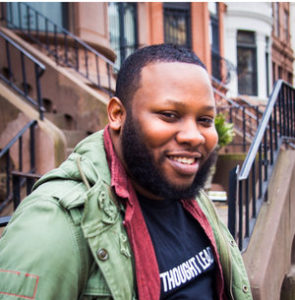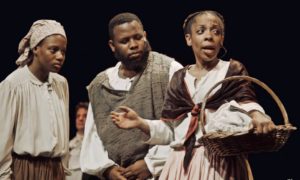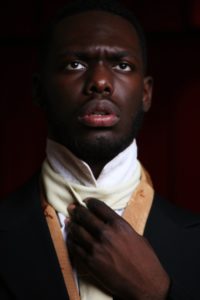Being a young, black, working class Americans from Brooklyn like Paul Gee and Najee Brown doesn’t confer many advantages – especially if you want a career in theatre or on screen.
Yet, partly thanks to the Fringe, both have been able to demonstrate the scale and variety of their talents.

The critical success they had from being in the cast of the a cappella musical Henry Box Brown last year opened the door to fresh possibilities back home – and has allowed them to return to Scotland with an even stronger version of the show.

Henry Box Brown follows the true story of a 19th-century American slave who mailed himself to freedom in a wooden box after his children and pregnant wife were sold.
Henry was an extraordinary character, driven by religious faith and a belief in human equality, who went on to become a prominent abolitionist.
To escape slave hunters he came to Britain where he toured concert halls, churches and other venues in England and Scotland and told his own story, sang spirituals and showed off a replica of his box. A Fringe show before the Fringe.
Paul (aged 26) plays the adult Henry – the power of his singing voice, his stage presence and dignity earning standing ovations, not least when he performs part of Amazing Grace.

The chance to play a positive and empowered black American is something he cherishes. He said: “I love telling the story through this role but there is sort of a pocket for people of colour in this industry. So many of the roles are linked to violence and vulgarity. There is a real lack of imaginative storytelling … but I’m confident of new way of storytelling to come.”
Paul has a close affinity with the character he plays. Both love music (Paul has a new album being released later this year), both are gifted performers and both have a strongly spiritual and moral dimension.
Another shared characteristic is sheer drive. In the musical Henry is berated for having “ambition”. What’s a virtue for a white landowner is a sin for a slave.
And the world has not moved on nearly far enough in the century and a half since his day with life’s dice still heavily loaded against African Americans.
However four and five star reviews, plus positive coverage in newspapers like The Times, have benefitted them on the other side of the Atlantic.
Success in Edinburgh helped attract backers and led to a six-city tour of Henry Box Brown in the USA and has now been seen by more than 35,000 people. This in turn has enabled them to refine and sharpen the show for its return to Edinburgh.
Paul is increasingly able to feel that if he keeps hammering away, the future could be a good one.
He says:“My ambitions are to continue what I am doing now – the acting, the music and everything else – at a larger scale. I want to be able to search for my name on the Internet and have it there on Netflix.
“And beyond that I want people to look at what I do and think ‘wow this is quality work’. It’s not about being cocky or proud, but about confidence in what I can achieve and the abilities I have been given.”
The musical was written by Mehr Mansuri and is produced by CTC New York Ensemble and the Children’s Theatre Company, which focuses on theatre with a social justice imperative. Over the last 19 years it has attracted a strong core of African American youth – whose talents are developed and showcased through the programme.
One way it can do this is by enabling them to work with significant figures from the US entertainment industry.
Henry Box Brown was originally by directed Tony Award winner Ben Harney (Broadway’s Dreamgirls) with compositions by NY composer, Frank Sanchez and arrangements by renowned Gospel Music Director, Eric Dozier.The score is by Oscar nominee – Best Original Score, Jack Lenz (Mel Gibson’s Passion of Christ) with new contributions by top NYC recording artist, Davon Redmond.
Najee’s experience shows how effective this can be. In 2018 he was part of the cast and this time round he serves as co-director alongside his long-time mentor Ben Harney, and has also introduced a thrilling new choreography.
The first trip to the Fringe gave him invaluable experience and confidence. That allowed him to direct his first production, Glimmerings of Hope, which in turn gave him the experience to co-direct Henry Box Brown.
Aged 28 he also makes music, and has choreographed anddanced on every stage from the Apollo to Carnegie Hall. He has an arts and media company called Mindlezz Thoughtz which focuses on inspiring and uplifting young people.
Najee has a strong sense of individual responsibility and also of justice. He also regards theatre as a tool for moral reasoning, something which can help promote human dignity.
He said: “When you get down to the heart of the story, it’s about love and sacrifice. There were people – who helped Henry and had to sacrifice. There were people in my life, in addition to my mother, who loved and sacrificed for me.
“In the beginning of the production we see Henry being taken away from his mother. When you see what is happening in America right now, there are children being taken away from their mothers.
“Our production urges us to consider what we can do right now, not later on– but what we can do in our backyards and get up and do something and challenge ourselves. It’s a shame, but the themes of our show very much resonates with us today.”
Also, having seen the way the US prison system operates, Najee also believes there are parallels with slavery with inmates being forced to work without pay, demeaned and debased.
These are issues he has addressed in a play he has written called The Bus Stop, which centres on a group of women – mothers, wives, girlfriends – waiting to visit their menfolk in jail.
Looking back over the past two years Mehr Mansuri said: “I’m not sure that people always realise the difference that success at the Edinburgh Fringe can make. It goes way beyond the fortunes of the show itself.
“It’s been a true honour for CTC to be able to provide opportunities for young African American artists, but also to provide a platform to celebrate their immense contribution to music and world culture.
“As an educational theatre programme, we feel it is only right to use our storytelling to tell the true and positive stories from African American history, indeed of American history. To that end, we can also act as a contributor to greater equality and for social justice.”
For tickets click here.

































